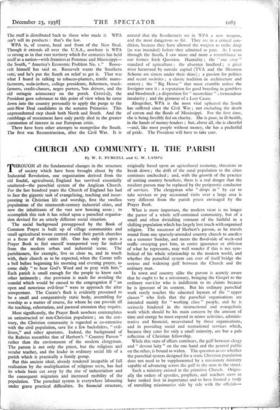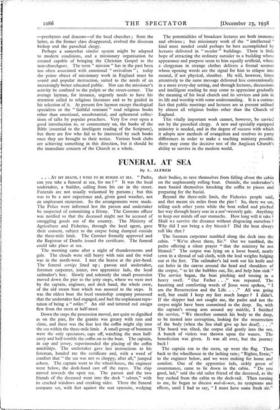CHURCH AND COMMUNITY : II. THE PARISH
By W. E. PURCELL and G. W. LAMPE
The social background presupposed by the Book of Common Prayer is built up of village communities and small agricultural towns centred round their parish churches as a focus of their entire life. One has only to open a Prayer Book to feel oneself transported very far indeed from the modern urban and industrial scene. The parishioners, for example, live so close to, and in touch with, their church as to be expected; when the Curate tolls a bell before beginning his morning and evening prayer, to come daily " to hear God's Word and to pray with him." Each parish is small enough for the people to know each other intimately ; due provision is made for avoiding the scandal which would be caused to the congregation if " an open and notorious evil-liver " were to approach the altar unrepentant. The Curate's flock is evidently presumed to be a small and comparatively static body, assembling for worship as a matter of course, for whom he can provide all the teaching, exhortation, and pastoral attention they require.
Most significantly, the Prayer Book nowhere contemplates an uninstructed or non-Christian population ; on the con- trary, the Christian community is regarded as co-extensive with the civil population, save for a few backsliders, " evil- livers," and other apostates. Indeed, the background of the Rubrics resembles that of Herbert's " Country Parson " rather than the environment of the modern clergyman. The parson is not only the priest, but the religious and secular teacher, and the leader in ordinary social life of a parish which is practically a family group.
But this ancient ideal, already rendered incapable of full realisation by the multiplication of religious sects, has had its whole basis cut away by the rise of industrialism and the consequent migration and increased mobility of the population. The parochial system is everywhere labouring under grave practical difficulties. Its financial structure, originally based upon an agricultural economy, threatens to break down ; the drift of the rural population to the cities continues unchecked ; and, with the growth of the practice of uniting country benefices, there is a real danger that the resident parson may be replaced by the peripatetic conductor of services. The clergyman who drops in " by car to take services or pay occasional visits over a large area is very different from the parish priest envisaged by the Prayer Book.
What is more important, the modern vicar is no longer the pastor of a whole self-contained community, but of a small and often dwindling remnant of the faithful in a shifting population which has largely lost touch with organised religion. The successor of Herbert's parson, as he travels round from one sparsely-attended country church to another on a summer Sunday, and meets the flood-tide of week-end traffic sweeping past him, in entire ignorance or oblivion of what he represents, may well wonder if this is not sym- bolical of his whole relationship to the modern world, and whether the parochial system can ever of itself bridge the serious and widening gulf between the Church and the ordinary man.
In town and country alike the parson is acutely aware that he ought to be a missionary, bringing the Gospel to the ordinary outsi ler who is indifferent to its claims because he is ignorant of its content. But his ordinary parochial work rarely touches the educated layman of the " upper classes " who feels that the parochial organisations are intended mainly for " working class " people, and he is seriously hindered in the instructional and evangelistic work which should be his main concern by the amount of time and energy he must expend in minor activities, adminis- trative and financial, necessitated by those organisations, and in providing social and recreational services which, because they cater for only a small minority, are but a pale reflection of Christian fellowship.
While this state of affairs continues, the gulf between clergy and " devout laity " on the one hand and the general public on the other, is bound to widen. The question arises whether the parochial system designed for a static Christian population does not need to be supplemented by a missionary ministry capable of advancing across the gulf to the man in the street. Such a ministry existed in the primitive Church. Origin- ally the orders of apostles, prophets, and teachers seem to have ranked first in importance and to have formed a body of travelling missionaries side by side with the officials- —presbyters and deacons—of the local churches ; from the latter, as the former class disappeared, evolved the diocesan bishop and the parochial clergy.
Perhaps a somewhat similar system might be adapted to modern conditions, and a missionary organisation be created capable of bringing the Christian Gospel to the non-churchgoer. The term " mission " has in the past been too often associated with emotional " revivalism " ; today the prime object of missionary work in England must be sound and popular instruction, suited to the needs of an increasingly better educated public. Nor can the missioner's activity be confined to the pulpit or the street-corner. The average layman, for instance, urgently needs to have his attention called to religious literature and to be guided in his selection of it. At present few laymen except theological specialists or the " faithful remnant " read religious books other than emotional, unsubstantial, and ephemeral collec- tions of talks by popular preachers. Very few ever open a good introduction to, or commentary on, the books of the Bible (essential to the intelligent reading of the Scripture), but there are few who fail to be interested by such books once they are brought to their notice. Various book clubs are achieving something in this direction, but it should be the immediate concern of the Church as a whole. The potentialities of broadcast lectures are both' immense and obvious ; but missionary work of the " intellectual " kind most needed could perhaps be best accomplished by lectures delivered in " secular " buildings. There is little hope of attracting the ordinary outsider to a building whose appearance and purpose seem to him equally' artificial, where a clergyman in strange clothes delivers a formal sermon whose opening words are the signal for hini to relapse into mental, if not physical, slumber. He will, however, liken attentively to the same message delivered less conventionally in a more every-day setting, and through lectures, discussions and intelligent reading he may come to appreciate gradually the meaning of his local church and its services and join in its life and worship with some understanding. It is a curious fact that public meetings and lectures are at present utilised by almost all religious bodies other than the Church of England.
Thii vitally important work cannot, however, be carried out by the parochial clergy. A new and specially equipped ministry is needed, and in the degree of success with which it adopts new methods of evangelism and resolves its party differences in order to make a teaching ministry possible there may come the decisive test of the Anglican Church's ability to survive in the modern world.



































 Previous page
Previous page